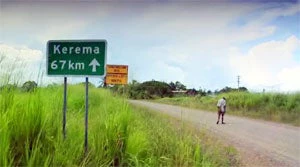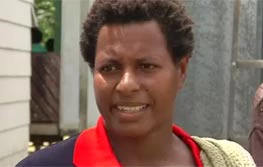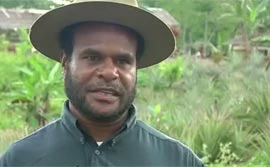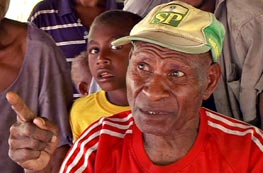
Recently I spent some time around Kerema, which although only 350 km from the country’s capital, feels as one of the most remote and cut-off places in Papua New Guinea. Kerema is the Gulf’s provincial capital and, with its surrounding villages, it has been cut-off from the rest of the country due to a mere 67 km of mostly un-passable road. Under the Roads Maintenance and Rehabilitation Project, the World Bank has been supporting the Government of Papua New Guinea to restore the road. Today, the Bank’s Board of Executive Directors approved the second phase of this project, which will see the rest of the road restored and paved to a proper national standard.
Speaking to villagers, doctors, and teachers, they painted a portrait of what life is like without a road. For them a road represents the gateway to schools, hospitals, trade and family. The lack of a road impacts everyone.
The Mothers
 |
| To get to the hospital, Eme has to walk hours while carrying her gravely ill daughter. |
The Kerema hospital itself is a somber scene. The building is dilapidated and falling apart—they can’t get building supplies transported to fix it. Often they can’t get basic medicines or equipment. I met up with the good Doctor John Kiap, the CEO of the hospital, and he told me he started crying when he heard we planned to reconnect the road to the country’s capital Port Moresby.
Women, children and babies flood into hospital in the morning—mostly from outlying villages—having walked hours clutching sick children. It is truly shocking seeing thirty or forty mothers waiting, looking so stressed, so exhausted, so hopeless. Some of the children looked so very sick. I met a woman, Eme, who had brought in her gravely ill daughter to hospital and was washing her daughter down outside to cool her fever. She was in tears when she was telling me her difficulties trying to come back and forth to get to the hospital. Her daughter’s little heart was beating out of her chest, her arms and legs were wrapped around her father with all the energy she could muster. Her long eyelashes were dewy but she didn’t have the energy to cry. It is without doubt one of the most distressing things I have ever seen. It should never have to be like this.
I spoke to Opao and some other women from outlying villages. They told me that when women give birth they have to walk 10-15 kilometres to the hospital as no ambulance can travel to get them. If they are lucky, some people from the village may carry them on a stretcher. Babies often die on the way.
The Entrepreneur
 |
| Treacherous waters make it difficult and dangerous for Ken's employees to haul in the drums of diesel fuel needed to power up the town's electricity. |
Boat access is one of the main avenues into Kerema. Over the years, many dinghies have capsized, killing hundreds of people. Boats are also the primary way goods make it to town.
I met with Ken, the largest entrepreneur in Kerema. Amongst other things, he provides diesel to power the town’s electricity. Because there is no road, it is brought in on dinghies laden with up to a ton of fuel. Many have sunk on the journey through the treacherous waters. Once the boats get near the shore the diesel barrels are thrown overboard and Ken’s employees have to swim out and bring the drums to shore.
The Schoolgirl
 |
| The lack of good roads make schoolgirls particularly vulnerable. Some girls have been raped walking home from school. |
The teachers and schoolgirls at Kerema school said the lack of a road has made life very difficult: school supplies are impossible to get in and students are often late to school. Most students have to board at the school, and it is difficult to get supplies in to feed everyone. At the end of term girls will often walk the long journey back to their villages. Many girls have been raped along the way. The girls are scared making the walk back home and the teachers—though stretched—will often try to escort them safely to their families. They said with a functional road they will be able to catch public transport, which will be much safer for them. This is simply unfathomable.
The Raincallers
 |
| Village chief Knamo is paying raincallers to not call the rain so road work can advance quickly |
I visited another village where road work has commenced but has been delayed due to heavy rains. Here I met the charismatic village chief Knamo. He is the big man of the village and has four wives. He is a big supporter of the road being developed as his village sits on the edge of the road and they aim to sell the sago and betel nut they produce in Port Moresby.
He is desperate for the road works to resume, so has engaged the local raincallers. The raincallers, a custom tradition in PNG, as the name suggests—call rain. He told me that there is something like “raincalling school” to train the raincallers.
He has been paying the local raincallers 100 Kina each to stop calling the rain so that roadworks can resume. However, it continued to rain. He believes that someone with a vested interest had been paying the raincallers a higher price to call rain. He asked the raincallers about this raincalling scandal but got nowhere. He said if it continues to rain, it will delay the road, and he will instigate an investigation into the raincalling scandal.
For all these people, the road is their lifeline. I have captured their stories and more on this video.


Join the Conversation